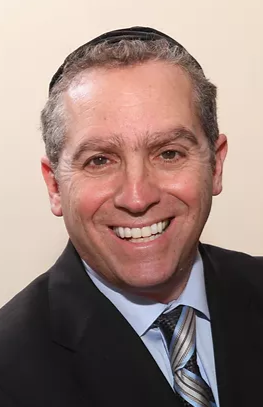
This week’s Parasha, Tzav, continues the discussion of the sacrifices that B’nai Yisrael were commanded to bring to the Bet Hamikdash. The Parasha begins with the words: "Hashem spoke to Moshe, saying: Command Aharon and his sons, saying: This is the law of the Olah offering." An Olah offering is one which is burnt entirely on the altar. Rashi comments that according to Masechet Kiddushinm (29a), "Every place where the word tzav (“command”) is used, it is an indication that the Torah is giving us a command that should be carried out with zeal and immediacy for all the future generations to follow the same way."
This also applies to Pesukim 5 and 6: "The fire on the altar shall be kept burning on it, it shall not be extinguished. A permanent fire shall remain aflame on the altar; it shall not be extinguished." We can learn from this that we must keep a flame burning constantly within us for Torah and Mitzvot. We must keep our enthusiasm as strong as on the day of our Bar Mitzvah and we must be careful not to fall into the trap of mediocrity. Our sacrifices today are our Tefilot of Shacharit, Mincha and Aravit, and we must concentrate on them to keep our Kavanah strong, so they do not become routine.
This Shabbat is also called Shabbat Hagadol because according to the midrash, before B'nei Yisrael left Egypt they participated in Egyptian idolatry, including the worship of sheep. Hashem told the people to mark their doors with sheep’s blood, so that Hashem can pass over the Israelite homes, thereby saving their firstborns. When the Egyptians saw this, they planned a massive assault, but Hashem protected B'nei Yisrael by afflicting the Egyptians with disease, so that they were unable to proceed with the plan. Because of these miraculous events, this Shabbat came to be called Shabbat Hagadol.
We celebrate the holiday of Pesach by having a Seder to thank Hashem from saving us, and to relate the story to our children and grandchildren. The Zohar says that those who recite the words of the Hagadah with joy, will merit to participate in the joy of the Shechina in Olam Habah! Hashem gathers the angels and tells them, "Go and listen to My children relating My praises and see how joyful they are over the fact that I delivered them from slavery."
At the start of the seder, we recite “Ha Lachma Anya”, this is the bread of affliction. Rabbi Frand says: If you were to ask the average Jew on the street, “Why do we eat matzah on Pesach?” The vast majority would respond, “Because that is what we ate when we were slaves in Mitzrayim”. While that answer would seem to find its source in the declaration of “Ha Lachma Anya”, it is only one of two possible reasons. Later on in the seder, we will make three vital statements– so vital, in fact, that Rabban Gamliel said that anyone who does not say them does not fulfill his obligation. One of the three is: “Matza zo sheanu ochliim al shum ma?” Why do we eat this unleavened bread? Because the dough of our fathers did not have time to become leavened when we rushed out of Mitzrayim.
Now, if you were to choose to commemorate one of these two matzah-related events associated with Yetziat Mitzrayim, which would you choose? The one that happened daily for nearly 210 years, or the seemingly coincidental one that happened because our forefathers did not have the foresight to prepare adequate provisions for their journey out of Mitzrayim? Furthermore, we have to ask ourselves: Which Jew doesn’t prepare food when leaving for a trip? Moshe had told the Jews that they were leaving on the fifteenth of Nissan. Why didn’t they have a bag ready with some fully baked bread?
One question actually answers the other. When Moshe Rabbeinu came to Bnei Yisrael and told them that Hashem would bring Pharaoh to his knees through the Makkot, and they would then leave Mitzrayim, they undoubtedly got excited. He told them that the Makkah called Dam (blood) would destroy Mitzrayim’s water supply, and they surely thought, No water? That will certainly force Pharaoh to set us free. They quickly packed enough provisions to carry them over until they would reach Eretz Yisrael.
But to their surprise, despite the devastation of the plague of blood infiltrating Egypt’s rivers and water supply, Pharaoh hardened his heart and would not let B’nei Yisrael go. So Hashem sent a warning about Tzefordei’a (frogs), so as those frogs jumped their merry way into Pharaoh’s bedroom, his food and throughout Mitzrayim, B’nei Yisrael once again assumed that the redemption was imminent, and they prepared for the journey. Pharaoh shocked Mishe once again with his stubborn refusal to allow them to leave.
This cycle continued, one Makkah after another with B’nei Yisrael packing to leave, and then being let down, until they practically gave up hope. When the time for redemption finally came on the Pesach night, they couldn’t work up the emotional energy to pack their provisions for the journey again. If eating matzah was indeed intended as a commemoration of a past event, remembering what our forefathers ate for nearly 210 years would be more significant. But the matzah we ate on the Seder Night is not merely a commemoration, but an eternal message from Hashem to Klal Yisrael: Yeshuat Hashem k’heref ayin – the salvation of Hashem comes in the blink of an eye. No matter how unlikely it may seem that we will merit salvation, things can turn around in an instant.
This is true not only on a national level, but on a personal level for each and every one of us as well. We find this concept spelled out already in the infancy of B’nei Yisrael’s stay in Mitzrayim. The Pasuk describes Yosef’s summons from the Egyptian prison to interpret Pharaoh’s dream: So Pharaoh sent and summoned Yosef, and they rushed him from the dungeon (Bereishit 41:14). Sforno explains that Yosef being rushed to Pharaoh was a foresight of what was to come when they left Mitzrayim before their dough could rise, because whenever the time comes for salvation, it happens with urgency.
Sometimes we wonder to ourselves: How will the ultimate Geulah ever come? With the Middle East in the tinderbox that it is and Eretz Yisrael under military threat on a daily basis, how will salvation ever come? Sforno said: the Navi (prophet) already told us that the Final Redemption will follow in the same way as previous redemptions: “Suddenly Hashem Whom you seek will come to His Sanctuary” (Malachi 3:1).
As we eat the matzah on the night of our first redemption, we remind ourselves of our forefathers rushing to leave Mitzrayim with unbaked dough, and prepare ourselves for the Final Redemption that will come in the blink of an eye, when we least expect it.
There’s an amazing story that will show how Hashems salvation happens also in modern times...in the blink of an eye” (k’heref ayin). This story took place by Kibbutz Sufa which was founded in 1982 by evacuated settlers and its is on the border of Central Gaza very near to the Egyptian border.
Just to give a little background, we go back to 1563 in Tzfat, Israel. The author of the Shulchan Aruch has just codified the Rashba’s explanation of our Talmudic passage into his Shulchan Aruch (Chapter 467:5). Wheat that has completely ripened can become Chometz if it is rained upon. If it still requires sustenance from the ground to reach full develop – then there is no problem.
Fast forward to Radin, Poland in the late 1890’s...the Chofetz Chaim writes in his Mishna Brurah, what apparently has been the custom for Jews in Europe for some time. He states that Shulchan Aruch only refers to an abundance of rain. However, if it rains a little bit – then the fully developed wheat is fine and can be used for the highest standard of Matzah. However, he does mention a tradition cited by Rabbi Avrohom Danzig in the Chayei Adam that the custom of the very pious is to cut the wheat earlier, while it is still somewhat green in order to ensure that there are no problems. The concern, of course, is the issue first mentioned in the Rashba.
The Chofetz Chaim mentions this custom of cutting the wheat early twice in his Mishna Brurah. Once regarding this topic and once earlier in a discussion (SA 453:4) about whether the wheat has to be guarded when it is cut or when it undergoes the grinding process. In his Biur Halacha, the Chofetz Chaim cites the practice of the Vilna Gaon who was careful only to eat Matzah that was watched from when it was cut. This too, the Chofetz Chaim points out, is because of the Rashba’s position.
Its now either late 2013 or early 2014 and the Hamas leaders are planing a devastating attack on the Israeli citizens. They will send terrorists through a tunnel who will tunnel across the border and emerge in a completely camouflaged, carefully chosen, wheat field. The thirteen terrorists will have several types of weapons, including AK 45 Assaullt Rifles and Rocket-Propelled Grenade Launchers. Their plan is perfect because the wheat is high enough at this time to serve as their camouflage but still not yet ripe enough to be harvested. Who would harvest green wheat in July? The plan to kill Israelis is more than perfect.
Its now 2014 in B’nei Brak Israel, as a group of Matzah bakers are in serious need of some green wheat still on the ground in order to fulfill the requirements of the stringency of the Rashba. They search all over Eretz Yisroel. Finally, they come across a wheat field located in the Hevel Shalom area of the north-western Negev desert. It was an area administered by the Eshkol Regional Council. Now time is of the essence and they cut a deal with the farmer and arrange for the wheat to be reaped immediately.
As planned, the 13 terrorists emerge from the tunnel. But wait...lo and behold, the wheat field is bare! It’s completely bare! The terrorists panic... “Who moved all the wheat stalks?! Oh No...An IDF watch station just spotted us! They're bombing us! Hurry, let’s crawl back into our hole in the ground and run for cover! Oh no...Six of us are hit! Let’s abandon them! Hurry, let’s get back to Gaza!”
Hashem has saved the Jewish people from a potentially devastating disaster if those Hamas Terrorists would have succeeded. Because of the stringency of keeping Matzah Shemurah those Jews were saved and for no other reason and the salvation once again came...”In the blink of an Eye...k’heref ayin!!!”
May we all keep the flame of enthusiasm for the Sedar nights burning as strong as the Olah offering did in the Bet Hamikdash. May we use the opportunity of the Sedar nights to convey the story of the redemption of our nation and the story of our own personal redemption to our children and grandchildren, so that they may grow up and continue to convey it to their children. May we see Hashems salvation come to Am Yisrael...K’heref Ayin, in the Blink of an Eye...so that we may link the generations until the Mashiach comes...very soon, in our days! Amen!
To everyone Shabbat Shalom and a Chag Kasher Ve Sameach!
Parasha perspective By Jack E. Rahmey from the teachings and guidance of Rabbi Amram Sananes.







